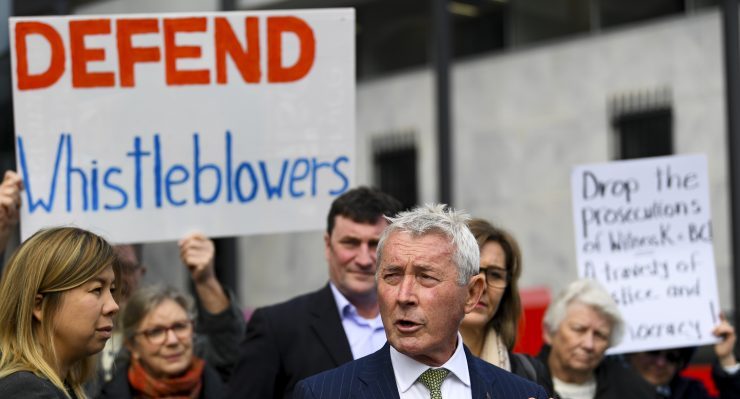
This week Four Corners aired an investigation into the now infamous prosecution of Australian lawyer Bernard Collaery and his former client, an Australian Secret Intelligence Service (ASIS) spy known as Witness K. Both men are accused of disclosing information about an ASIS operation against Timor-Leste in 2004. I was interviewed for the program which aired on Monday night.
The program explained, correctly, that Timor-Leste was just emerging from a 24-year genocidal Indonesian operation, was extremely poor and had very few resources at the time of the operation. Just months before Timor-Leste gained independence in 2002, the Australian government withdrew from the maritime boundary jurisdiction of the International Court of Justice and the International Tribunal on the Law of the Sea. This withdrawal prevented Timor-Leste from asserting its rights under international law to a maritime boundary halfway between it and Australia.
Timor-Leste needed immediate access to an oil and gas filed 135 nautical miles off its south coast. But the Australian government was denying it access in order to force it to surrender the much larger Sunrise and Troubadour gas fields (together called Greater Sunrise).
The spy diversion
The government turned to ASIS, its intelligence espionage agency tasked with collecting intelligence outside Australia. ASIS used the cover of an aid project to install listening devices in Timor-Leste’s ministerial offices. The operation gave Australia secret access to Timor-Leste’s internal deliberations and negotiating positions.
Four Corners covered this aspect of the story — how the espionage operation targeted a poor, defenceless country.
But it left out a crucial element: the operation drew precious intelligence resources away from the war on terror, just as the Australian government was assuring parliament and the public that it was doing everything possible to keep Australians safe. On September 9, 2004, a car bomb targeted the Australian Embassy in Jakarta. Just under a dozen people were killed, including an embassy security guard, four Indonesian policemen, the gardener, a visa applicant and some others. The group known as Jemaah Islamiyah claimed responsibility.
A few months before, the Australian government had released its white paper on terrorism. It identified “extremist Muslim” terrorism as a focus more than 50 times, and Indonesia was said to be central to Australia’s counter-terror strategy, receiving a hundred mentions in the space of 110 pages. ASIS was to be a vital pillar of the counter-terror strategy. It would have an obvious role in gaining intelligence about Jemaah Islamiyah and other “extremist Muslim” terror groups.
And yet, despite all the anti-terror rhetoric, valuable ASIS resources were being deployed away from the war on terror.
The broader trends
Four Corners left out another important aspect: the use of ASIS for commercial purposes was just one element of a much larger use of state assets for corporate wealth.
From 1970 onwards, what is now the government agency Geoscience Australia conducted scientific surveys of Australia’s undersea geology, and then handed over this publicly-funded information to petroleum companies for almost nothing. In 1988, Treasury, with the support of the Department of Finance, objected to such valuable information being given away to private interests, urging “a much more substantial level of cost recovery”. But the Department of Foreign Affairs insisted the “national interest” required taxpayers fund the costs and — crucially, the risks — of investment in fundamental research, while the corporate sector benefited from the energy riches in the continental shelf.
On September 4, 1984, West Australian premier Brian Burke formally opened the $27 billion North West Shelf Gas Project, which was operated by a then little-known company called Woodside Petroleum. It began exporting liquefied natural gas (LNG) in 1989. The project has today become one of the largest LNG producers in the world and Woodside has become Australia’s largest standalone oil and gas company, and one of the top 20 stocks in the ASX by market capitalisation.
The Australian government has seemingly deployed the full weight of its diplomatic, legal and scientific assets over decades to secure massive benefits for Woodside’s shareholders. In return, according to Woodside’s own calculations in February 2017, governments have received approximately $26 billion in royalties, excise and taxes from the North West Shelf Project since it began in 1984.
Other governments have taken a different approach: the Norwegian government is the largest shareholder in Statoil, its state oil company. Statoil’s workers elect several of the company directors, and its shareholder meetings are open to the public, as are its financial statements. The Norwegian government created the “Oljefondet” (or Oil Fund) in 1990 to invest Norway’s oil revenue. The fund had US$1 trillion (more than A$1.2 trillion) in December 2017.
In Australia, the “national interest” has instead amounted to the socialisation of costs and risks, and the privatisation of profits, with taxpayers getting a trickle of revenue in return.
Maybe the ABC and other news agencies will eventually cover all this.
Clinton Fernandes is a professor of international and political studies at UNSW Canberra, and author of Island off the Coast of Asia: Instruments of Statecraft in Australian Foreign Policy.








After watching the 4 Corners show I wondered even more about the dumbness of prosecuting Collaery. Witness K may have been doing the right and moral whistleblowing thing but he was employed as a secret agent so it’s not hard to understand why he was prosecuted.
Collaery in the other hand was just a lawyer representing his client. His prosecution seems an even bigger assault on rule of law and due process than the Gobbo debacle. Collaery’s prosecution guarantees the matter won’t go quietly into the night as he himself promised at the end of the show.
The executive gave made their bed and must now lie in it. Given their lengthy hounding of Collaery it’s unlikely he’d agree to a non disclosure agreement in return for dropping charges. Another too smart by half overreach by blithering bullies. Maybe Brandis isn’t quite the fool I thought.
When even Brandis didn’t think it worth pursuing : shows what sort of petty, vindictive, nasty, pernicious, supercilious examples of humanity Porter and this government are?
While Labor stands by ……
It’s all being – particularly the secret court hearing bit – to protect the behaviour of the liberal politicians involved. We do “look after our mates in the liberal party” you know.
“Witness K may have been doing the right and moral whistleblowing thing but he was employed as a secret agent so it’s not hard to understand why he was prosecuted.”
My memory is not what it was, so maybe I’m wrong. But I thought that Witness K reported his concerns, about what he been ordered to do, to his senior officer and received permission/authority to consult a lawyer and the one he chose was Bernard Collaery.
Bernard Collaroy was chosen for Witness K by his supervisors, as he had security clearances from his time as Attorney General.
There are times when, it is not in the national interest, to shoot yourself in the foot, to draw attention away from an embarrassing scandal involving essentially stealing from your poorest neighbor.
When this over, Bernard Collaroy probably already has interviews and recording ready to go. If he were to do an Epstein, I am sure the waves would be bigger than a tsunami.
Well done, Porter! You have brought the eyes of the world, on to our theft of about 5 billion dollars from Timor Leste. No one else could have got this issue so much air time.
I was under the impression that the reason Witness K was prompted to make an internal complaint in the first place was when Downer & a (DFAT?) official received remuneration from Woodside, apparently as “payment for services rendered” for redirecting ASIS assets to a non-security, purely commercial activity.
If I was engaged in the sort of job that Witness K had, risking jail in a foreign country in order to serve my country would be a given. Risking jail to advantage a corporation that may or may not pay substantial fees/taxes to the Commonwealth is somewhat more unsavoury, but still part of the job, I guess. Risking jail because a Liberal party donor could call in a favour and then pay off a Minister personally, while in the middle of anti-terrorist missions where people have been killed, is probably not what he signed up for.
That Witness K thought that this apparently well off-piste behaviour could be resolved by securely informing elements of his own organisation who might share his disgust is entirely reasonable. He was playing it by the book.
Any wonder this government wants to keep it ‘in camera’ – as far away from cameras as they can?
I wonder if we could get a list of shareholders of Woodside petroleum?
Probably make for very interesting reading, don’t you think??
From the years of evidence :- for Limited News Party governments, it seems that not only is industrial espionage (to profit certain donors) in “the national interest”, but so to is the diversion of resources away from keeping track of potential terrorism, to carry out that espionage?
‘Maybe the ABC and other news agencies will eventually cover all this. ‘
And risk more AFP raids.
The whole process also leaves out the involvement of Australian politicians and the lack of any punishment for them.
Could there be a better argument for a strong federal anti-corruption body with power over the misconduct of political opportunists ?
The only ones being punished are the individuals that tried to tell the rest of us, what our government was doing with our resources to benefit a private company – that was probably donating to the party in government?
If there was “nothing wrong” with the original incident – why punish the ones that wanted to tell us it happened ……..?